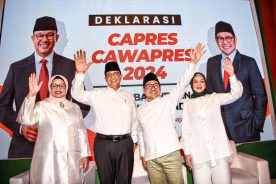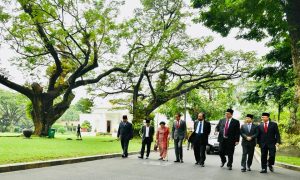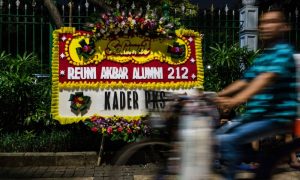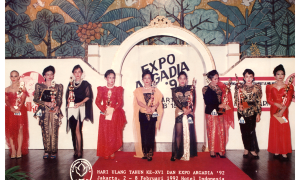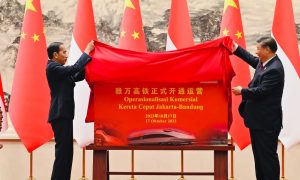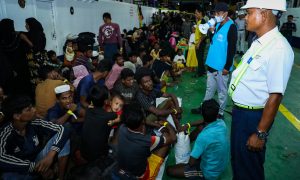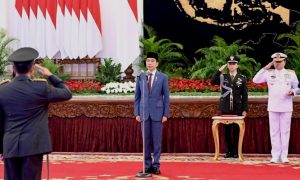In Indonesia’s 2019 presidential election, the flow of support from Islamic groups to the two presidential tickets was distinctly polarised. Conservatives rallied behind Prabowo Subianto and Sandiaga Uno, whereas Nahdlatul Ulama (NU)—the country’s biggest Islamic organisation, which claims to represent up to 90 million Muslims—unequivocally endorsed Joko Widodo (Jokowi) and Ma’ruf Amin. A growth in partisan polarisation among Indonesian Islamic organisations had been evident since the 2014 presidential election, when many NU followers solidifyied their support for Jokowi. It only grew stronger in 2019, when Maruf Amin, NU’s supreme leader (rais aam), was nominated as Joko Widodo’s running mate.
In contrast, the 2024 presidential election exhibits the opposite trend. Islamic groups’ support for the current presidential candidates are primarily being driven by political opportunism instead of by stark ideological differences.
Our research substantiates observations of a de-polarisation in 2024 through analysis of an original database recording the religious affiliations of each candidate’s national campaign team (tim sukses/“success team”) members. In contrast to the 2019 presidential election, the composition of religious figures represented in each tim sukses during this year’s presidential election reflects how ideological divisions—while they still exist—have weakened considerably.
Islamic support by the numbers
Based on numerous media reports detailing the officially-announced lineup of tim sukses, we are able to map out how different Islamic organisations and their leaders are dividing their loyalties between the 2024 candidates. The Anies Baswedan—Muhaimin Iskandar (branded as AMIN) coalition boasts 49 affiliated Islamic figures, constituting 29% of their total tim sukses members. The Prabowo Subianto–Gibran Rakabuming Raka coalition has 69 Islamic figures, accounting for 27% of their total, while the Ganjar Pranowo–Mahfud MD coalition trails with the lowest percentage at 20%, comprising only 8 Islamic figures.
The absolute number of Islamic figures on the Ganjar–Mahfud team is much lower than the other tickets, because Ganjar’s presidential candidacy is primarily backed by the Indonesian Democratic Party of Struggle (PDI–P), which also dominates the composition of Ganjar-Mahfud tim sukses. While Ganjar is also supported by one Islamic party, the United Development Party (PPP), there are only a handful of PPP figures among the ranks of his tim sukses, likely because it is a small party which only barely meets the Indonesia’s 4% parliamentary threshold. As Ganjar’s primary political supporter, PDI-P has kept a tight grip on his presidential campaign and has ensured that a majority of his tim sukses come from its own ranks.
By contrast, both AMIN and Prabowo–Gibran coalitions have more Islamic-oriented supporting parties to fill out their tim sukses. AMIN is supported by the National Awakening Party (PKB), which is affiliated with NU, and the Prosperous Justice Party (PKS) which is affiliated with the Muslim Brotherhood-influenced Tarbiyah movement. AMIN’s vice-presidential candidate, PKB Chairman Muhaimin Iskandar, is the great-grandson of the founder of NU Bisri Syansuri, adding to his charismatic appeal among NU figures.
Prabowo and Gibran’s Islamic party support comes from the National Mandate Party (PAN)—which is loosely linked with Muhammadiyah—and the Indonesian People’s Wave Party (Partai Gelora), a new party established by several former PKS leaders.
Religious figures affiliated with NU dominate the list of tim sukses members of Anies and Prabowo. Within AMIN’s coalition, 24 out of 49 members are affiliated with NU, the Prabowo–Gibran coalition claims 18 out of 69 and the Ganjar–Mahfud coalition has 4 out of 8. In stark contrast, the representation of Muhammadiyah, the second largest Islamic organisation in Indonesia, has relatively meagre representation. Only two members of the AMIN and Ganjar–Mahfud campaigns teams are affiliated with Muhammadiyah.
The representation of Islamic figures affiliated by the Tarbiyah movement, the forebear of the Islamist Prosperous Justice Party (PKS), is noteworthy. They comprise 16 members of AMIN’s tim sukses, surpassing those from Muhammadiyah.
From the composition of each respective tim sukses, we can see how traditionalist Islamic groups, (represented by NU) merge with modernist (represented by Muhammadiyah) and conservative Islamist groups (represented by Tarbiyah/PKS). Both AMIN and Prabowo–Gibran coalitions have tim sukses that unite NU and Tarbiyah figures.
The realities of intra-NU politics defy Muhaimin Iskandar’s claim of bringing NU communities in behind Anies Baswedan.
NU factionalism on show after Anies-Muhaimin surprise
Many kyai who are backing AMIN are owners of large Islamic boarding schools (pesantren induk) which usually have a large network of students (santri) in dozens of smaller pesantren. It is this extensive kyai–santri network that is being sought by the tim sukses of each candidates, since each of them consist of tens of thousands prospective voters who might decide a candidate’s political fortunes within a given pesantren’s locality.
The AMIN team’s mobilisation among NU ranks seems to be paying off. According to the latest survey released by Indikator Politik Indonesia on 18 January, Anies’ support in East Java increased by 9.3 percent from 1 December 2023 to 6 January 2024. However, Prabowo still has a commanding lead in the province with 48.2% support, Ganjar 24.5%, and Anies 21.7%.
In the Prabowo–Gibran coalition, NU kyai supporting the pair are those who have previously endorsed and established relationships with either Prabowo or Jokowi in previous elections. A pivotal endorsement for Prabowo–Gibran comes from Habib Luthfi bin Yahya, the supreme leader of the Jam’iyyah Ahli Thariqah al-Mu’tabarah al-Nahdliyah, the main association of Sufi Order (tariqa) to which most NU clerics are affiliated. Notably, Habib Luthfi also holds a position as a member of President Jokowi’s Council of Presidential Advisors.
The eclipse of Muhammadiyah by NU
The pragmatic and opportunistic nature of religious figures inclusion in each candidate’s tim sukses have created pressures within both NU and Muhammadiyah to allow their respective clerics and activists to back one of the presidential candidates, while also retaining their status as politically neutral religious organisations. Long divided into multiple factions based on personal allegiances to influential kyai, NU’s support during this year’s election is equally divided among the three presidential candidates. While NU’s national leadership (Pengurus Besar Nahdlatul Ulama, or PBNU) has officially taken a neutral position, most prominent NU clerics and activists have pledged their endorsement toward one of the candidates.
Meanwhile, Muhammadiyah activists are torn between its leadership’s official position to retain neutrality and their own desires to publicly support presidential candidates. Many of them see the 2024 election as crucial for the future of the 111-year-old Islamic organisation, as it is seen to be losing political influence vis-à-vis other organisations like NU.
Muhammadiyah has in the past enjoyed significant patronage from post-reformasi Indonesian presidents, particularly under Susilo Bambang Yudhoyono (SBY), during whose first term Muhammadiyah figures held five cabinet portfolios. Today, however, Muhammadiyah’s representation in the government is reduced to just one minister in Jokowi’s second-term cabinet—the Coordinating Minister of Human Development and Cultural Affairs, widely considered an unimportant and not especially lucrative position.
This is in contrast to NU, which is represented not only by Vice President Ma’ruf Amin but also an additional four ministers, including the Minister of Religious Affairs. In addition to the cabinet, NU affiliated figures also dominate in appointments of top-echelon civil service positions, especially at the Religious Affairs Ministry, which has the authority to regulate all things related to Muslim affairs, including religious pilgrimage and pesantren education. With an annual budget of 63 trillion Rupiah (US$4 billion), it has the fourth largest budget of all Indonesian ministries, making it very lucrative for NU.
Muhammadiyah activists are spooked by the rapid decline in the organisation’s social base. In a September 2023 article, pollster Denny JA found that only 5.7% of his August 2023 survey respondents self-declared themselves as Muhammadiyah followers, while in 2005, more than 9.4% of respondents did so—a decline of 40% over an 18-year period. Other analysts have attributed this decline to a growing number of Muhammadiyah cadres (particularly the young) joining more religiously conservative Islamist groups like Tarbiyah/PKS, Hizb-ut Tahrir Indonesia (HTI), and various Salafi-leaning groups.
Due to these factors, there is a growing perception within its ranks that Muhammadiyah is losing out to NU in the competition for political favour and patronage during the Jokowi years. Thus the organisation, despite its officially neutral position, seems eager to cultivate relations with all three 2024 presidential candidates.
This can be seen clearly in its decision to host a series of presidential candidate fora at Muhammadiyah University campuses in Solo, Malang, and Surabaya between 21 and 24 November 2023. During these forums, Muhammadiyah leaders asked the candidates whether they plan to award cabinet positions to Muhammadiyah cadres. Both Anies Baswedan and Prabowo Subianto have indicated they might do so, with Prabowo giving hints that at least two ministries—education and health—might be allocated to Muhammadiyah cadres.
Conclusion
To conclude, the non-ideological political manoeuvres of Indonesian Islamic organisations and parties in backing the three presidential candidates in the 2024 election, irrespective of past ideological differences between them, further proves the assertion that Indonesian politics continues to move away from ideological competition. Instead, Islamic groups and parties, along with their nationalist counterparts, are placing more emphasis on political opportunism as the primary drivers of forming these presidential support coalitions.
This means that concerns over the politicisation of Islam, and identity politics, which dominated the 2019 presidential election, have largely dissipated during the 2024 contest. Islamic parties and organisations are more concerned with gaining political appointments and patronage opportunities from whomever is elected as the new Indonesian president. This seems more urgent among groups that appear to have lost political influence like Muhammadiyah. It has been incentivised to regain influence through more extensive engagement with presidential candidates so as to not lose out to groups with more representation at the centre of power, like NU. Whether this engagement will be successful or not remains to be seen.
 Facebook
Facebook  Twitter
Twitter  Soundcloud
Soundcloud  Youtube
Youtube  Rss
Rss 
